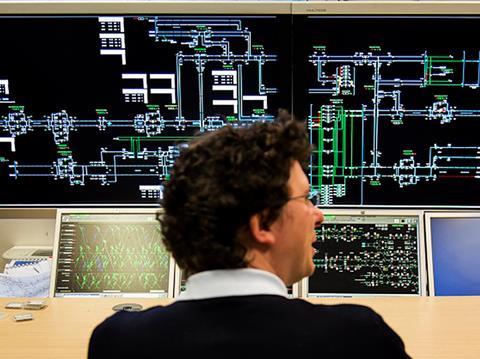
FRANCE: Following an 18-month research programme, SNCF Réseau has selected three consortia to develop, commission and maintain pre-production digital interlockings as part its strategy to introduce Regional Command Centres based on a new generation of signalling and control technologies.
Under the Argos innovation partnership launched in June 2018, 35 specialists from SNCF Réseau have been working with 115 experts from four consortia to research the best technical options for computer-based interlockings to replace life-expired mechanical, electro-mechanical and electrical systems. The infrastructure manager announced on October 28 that the research phase had been completed on schedule ‘despite the current health crisis’, and it was now ready to move onto the development stage.
The three consortia selected by SNCF Réseau are Thales/Engie Solutions/Vossloh; Hitachi Rail STS/Eiffage Énergie Systèmes/Systra; and Alstom. Each group has been tasked with upgrading an existing installation and developing a pre-series interlocking, with a view to commissioning the first digital interlockings by the end of 2023. Over the next 30 months, each consortium must develop its technical solution and achieve rail and cybersecurity approval, together with an Authorisation for Commercial Operation from rail safety regulator EPSF.
Emphasising that ‘the partnership is a long-term commitment’, SNCF Réseau said that following the 30-month development period, the partners would ‘remain bound by a 15-year rollout contract’, in order ‘to achieve sustainable and durable industrial excellence’. The programme envisages a 10-year maintenance and support agreement with an optional five-year extension.
Argos is targeting a significant reduction in lineside hardware, as well as reduced installation and maintenance costs. SNCF Réseau is also looking to ensure ‘high levels of technical and economic performance’, along with faster incident response to reduce the impact of any failures.
Once the interlockings reach full series production, the infrastructure manager expects to achieve a 15% reduction in installation and maintenance costs, whilst cutting the lead time for installing a medium-sized interlocking from three years to two. The programme objectives envisage that by 2030 around 30 interlockings could be placed in service each year.
‘Our goal is to roll out an efficient, resilient, easily maintainable system that can be installed and tested with minimum impact on traffic’, explained Anne-Sophie Naboulet-Larcher, Technological Strategy & Contract Award Manager at SNCF Réseau.

Pre-series installations
The Thales-led consortium has been selected to deliver a first production interlocking for the Lyon – Vienne line in Auvergne-Rhône-Alpes region.
Thales will be responsible for project management, system development and delivery. Engie Solutions will undertake research, projects, technical inspections and compliance checks and Vossloh Cogifer the detailed design and functional testing. The group has also been working with civil engineering consultant Setec to develop new methods to help achieve the required 30% reduction in delivery times.
‘It was 20 years ago that Thales began delivering computerised signalling systems’, recalled the company’s Vice-President, Main Line Signalling, Yves Joannic. ‘We are proud that the first solution chosen by SNCF Réseau for developing its high-performance network is that proposed by the Thales-Engie Solutions-Vossloh group.’
Working in partnership with an SNCF Réseau team from Dijon, Alstom will install a variant of its Smartlock interlocking family at Montbard. This will control a 30 km section of the Paris – Dijon main line including a connection to the LGV Sud Est high speed line.
‘With railways becoming ever more complex, operators need a system that they can count on to guarantee the performance and availability of their network’, said Jean-Baptiste Eyméoud, President of Alstom France. ‘We thank SNCF Réseau for their trust in our innovation management and together to be able to bring interlocking technology to a new standard.’
The Hitachi-led group will be responsible for preproduction interlockings to control the signal box at Arzwiller and the automatic block signalling between Réding and Saverne in the Grand Est region.
Hitachi Rail STS will be responsible for system development, specification and delivery. Eiffage Énergie Systèmes will work on the signalling and Systra will undertake design studies, verification, technical inspections and compliance checks.
The consortia said its modular technology would be particularly well adapted to local or centralised operation, with system resilience enhanced by means of geographical redundancy and built-in cybersecurity. Direct interfaces between the modular interlocking and lineside objects would reduce the amount of cabling needed, whilst the compact enclosures would slot easily into existing field installations.
‘The two years that we have spent working with SNCF Réseau and its engineers in this innovation partnership have enabled us to pool our experience’, said Gilles Pascault Chairman of Hitachi Rail STS France. ‘The contract that has been awarded is a tribute to the skills and efforts of the men and women who played a part in ensuring the success of the first part of the project.’

















